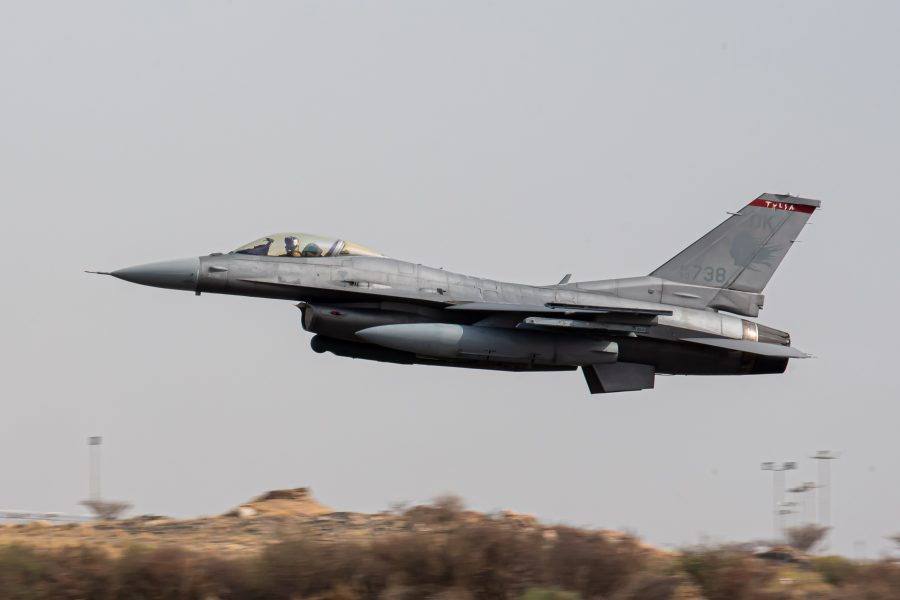A U.S. Air Force F-16 shot down a Turkish government drone on Oct. 5 after it flew within half a kilometer of U.S. troops in Syria.
The incident was an extremely rare military engagement between two NATO allies, who were already at odds over a range of security issues.
Secretary of Defense Lloyd J. Austin III and Chairman of the Joint Chiefs of Staff Air Force Gen. Charles Q. Brown Jr. called their Turkish counterparts to try to defuse the situation.
The incident played out the morning of Oct. 5 over the skies of northeastern Syria.
Turkey has been conducting airstrikes on Kurdish groups in Syria and Iraq it claims were linked to an Oct. 1 bombing outside the Turkish Interior Ministry in the capital of Ankara.
There are around 900 U.S. troops in Syria, who work with the Kurdish-led Syrian Democratic Forces (SDF) to combat the Islamic State group. That SDF insists it had no involvement in the bombing in the Turkish capital.
At around 7:30 a.m. Syria time on Oct. 5, U.S. forces observed drones conducting airstrikes in Hasakah, Syria, including inside a “declared U.S. restricted operating zone,” Pentagon Press Secretary Air Force Brig. Gen. Patrick S. Ryder told reporters.
Some of the Turkish strikes on Oct. 5 were around one kilometer from U.S. forces, prompting Americans to take cover in bunkers, according to the Pentagon.
At around 11:30 a.m., a Turkish drone reentered the area and was headed in the direction of U.S. forces, according to the U.S. officials. When the drone got around half a kilometer away from U.S. forces, a U.S. F-16 fired an air-to-air missile that downed the drone.
“We did communicate with Turkey our inherent right to self-defense in the face of a potential threat,” Ryder said. “Commanders on the ground did assess that there was a potential threat, and so they took prudent action.”
In a call with Turkish Minister of National Defense Yasar Guler after the incident, Austin “urged de-escalation in northern Syria and the importance of maintaining strict adherence to deconfliction protocols and communication through established military-to-military channels,” the Pentagon said in a readout of the call.
“It’s a regrettable incident,” Ryder said. “No U.S. forces were harmed. We took appropriate action based on the situation on the ground.”
U.S. officials say they do not believe Turkey was trying to deliberately target American troops.
The Turkish Embassy in Washington did not respond to a request for comment.
“We will continue to keep those lines of communication open to hopefully prevent these types of incidents,” said Ryder.
In Brown’s call with Chief of the General Staff of the Turkish Armed Forces Gen. Metin Gürak, the generals “discussed our shared objective of defeating ISIS and the need to follow common deconfliction protocols to ensure the safety of our personnel in Syria following today’s incident,” according to the Pentagon.
The episode happened at a sensitive moment, as the U.S. is seeking Turkey’s support to secure Sweden’s entry into NATO, pursue diplomacy over Ukraine, and deal with terrorist dangers.
The bombing in Ankara was ascribed to the Kurdistan Workers’ Party, or PKK, which Turkey and the U.S. consider a terrorist group. Turkey considers the U.S.-backed Syrian Democratic Forces to be linked to PKK, which the SDF denies.
Turkey’s foreign minister said Oct. 4 that Kurdish militants’ facilities in Syria and Iraq were “legitimate targets,” including energy infrastructure.
Turkey claims the perpetrators of the bombing crossed through SDF-controlled territory, which it denies.
“The perpetrators of the Ankara attack did not pass through our region as Turkish officials claimed,” Mazloum Abdi, the head of the SDF, said in a statement. “We are not a party to the civil conflict in Turkey and we do not encourage the escalation of this conflict.”


